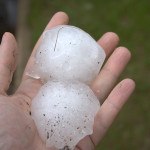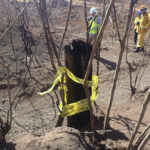Ecuador will use its oil reserves to meet export obligations after a landslide triggered by flooding ruptured a major pipeline, the oil minister announced.
Petroecuador, the state-run oil company, initially said it would delay some exports, declaring force majeure — a legal declaration that means it may not fulfill all contract obligations.
But Oil Minister Galo Chiriboga made assurances later Friday that the company would meet obligations with reserves, and exports would not be affected.
“It’s a worrying issue, but we shouldn’t be alarmed,” Chiriboga said in an interview with Quito-based Radio Exa. “There are people working there. Our oil exports, our oil production will not be affected.”
The ruptured pipeline, which runs 314 miles through the Andes mountains just east of Ecuador’s capital, Quito, dumped 4,000 barrels of oil into a nearby swamp, oil company president Fernando Zurita said.
“Thankfully, the spill happened in a marsh, which trapped the majority of the oil,” Zurita told Quito-based Exa Radio from the spill site. “Right now, we are working in the area to prevent further contamination.”
The pipeline transports nearly 70 percent of the 511,000 barrels of crude produced daily in Ecuador, South America’s fifth-largest oil producer.
Operations were suspended late Thursday. A second duct that transports oil derivatives also remains closed.
In a statement, Petroecuador said that oil production has not been affected because barrels of crude extracted since the rupture have been stored at fields in the country’s Amazon region while the pipeline is being repaired.
But the fields, which can store up to 677,000 barrels, already are half full, Petroecuador added. And production will be cut if storage capacity fills up before the pipeline is fixed — an estimated 72-hour project, the company said.
Flooding from downpours that began in mid-January has killed 23 people, forced about 9,000 to flee their homes and damaged property for hundreds of thousands more, the country’s civil defense office said.
Recovery is expected to cost more than $1 billion, Security Minister Gustavo Larrea told La Hora newspaper. The government is preparing to dredge rivers, build new levees and roads and offer victims long-term, low-interest loans to rebuild their lives, he said.
Heavy rains also have battered neighboring Peru, killing 16 and driving about 1,700 people from their homes, according to a Peruvian Civil Defense report.
Associated Press Writer Jeanneth Valdivieso contributed to this report.
Was this article valuable?
Here are more articles you may enjoy.

 MGM Resorts Sues US FTC to Stop Investigation of Casino Hack
MGM Resorts Sues US FTC to Stop Investigation of Casino Hack  CoreLogic Report Probes Evolving Severe Convective Storm Risk Landscape
CoreLogic Report Probes Evolving Severe Convective Storm Risk Landscape  Justice Department Preparing Ticketmaster Antitrust Lawsuit
Justice Department Preparing Ticketmaster Antitrust Lawsuit  Hawaiian Electric Hits 40-Year Low Ahead of Maui Fire Report
Hawaiian Electric Hits 40-Year Low Ahead of Maui Fire Report 